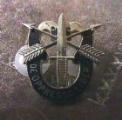Quite honestly it is an unfortunate play on words made by General McChrystal that he probably wishes he could take back.
We have "Radio in a Box," a mini radio station that can go anywhere and set up quickly and begin broadcasting.
What he meant by "Government in a Box" is that GIROA would identify leadership and a tashkil of authorized manning (ministers, officials, police, etc) to go into areas directly behind the "Clear" force where there previously was no true GIROA presence. Like these radio stations would come in as a package and be able to hit the ground running.
Unfortunately the phrase implys something packaged up by the Coalition; and when also delivered by Coalitoin security forces, in Coalition aircraft, to a newly "liberated" populace that has been receiving governance of some sort from the Taliban for years, and little to none from GIROA; it does create perceptions of illegitimacy that are largely unfair and certainly unintended, but there all the same.











Bookmarks